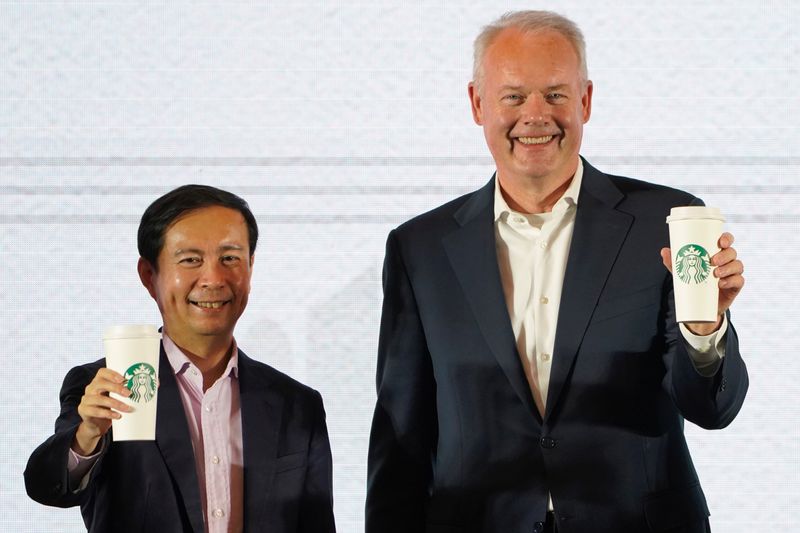By Hilary Russ
NEW YORK (Reuters) -Starbucks Corp's longtime former Chief Executive Officer Howard Schultz will return to lead the company for the third time, taking over as interim CEO and driving strategy for dealing with a growing union drive at U.S. cafes.
Current chief executive Kevin Johnson will retire, and Starbucks (NASDAQ:SBUX) will look for a new leader, the company said on Wednesday. Shares of the coffee chain were up 4.8%.
Schultz is practically synonymous with the company he took over in 1987. He expanded it into a coffee behemoth that made venti cappuccinos a global phenomenon.
"Schultz is a revered leader and uniquely well-qualified to steward" the company, said Credit Suisse (SIX:CSGN) analyst Lauren Silberman. Schultz will receive $1 of compensation.
The board expects to have selected a new leader by the fall, with help from executive search firm Russell Reynolds Associates, which it enlisted in 2021. Schultz did not make an appearance during Wednesday's annual shareholder meeting.
Separately, shareholders voted down a proposal for the company to produce annual reports on the prevention of harassment and discrimination in the workplace.
Johnson signaled to the board of directors a year ago that he might retire when the COVID-19 pandemic waned, he said in a company statement.
Johnson, 61, has been at Starbucks for 13 years, the last five as CEO.
Johnson steered the company through the worst of the pandemic, when cafes around the world had to shutter temporarily. While sales initially nosedived, they roared back as customers shifted to to-go and drive-thru and placed orders on Starbucks' mobile app.
The company also shifted its approach to building new cafes and is now adding more smaller stores with less room for seating and more emphasis on to-go orders in urban areas, while adding more drive-thru space in suburban locations.
Under Johnson's watch, Starbucks also lifted wages for employees several times - before most other global restaurant chains. Hourly starting pay will range from $15 and $23 by this summer.
UNION PUSH
The success of the mobile app, however, led to long lines and overworked employees in some areas. That barista burnout, as well as accusations by some workers that they were not getting enough protection from the virus at work, contributed to a surge of union organizing in U.S. locations.
On Tuesday, a federal labor board accused Starbucks of unlawfully retaliating against two employees in a Phoenix, Arizona, cafe for trying to unionize their store.
The same day, a group of investors with $3.4 trillion under management urged the company to stop sending anti-union communications to its employees and to adopt a neutral policy towards unions.
The group, led by Trillium Asset Management and SOC Investment Group, said Starbucks risked damaging its positive reputation as a pro-employee brand by fighting the union.
Schultz has long said Starbucks did not need unions because it works so closely with employees, whom it calls "partners."
He has already had a run-in with Workers United, the union now representing employees at six stores. Employees at more than 140 stores in 27 states have asked for union elections in the last 7 months.
In November, Schultz spoke to employees who had been ordered to a large meeting with managers in Buffalo, where the first of Starbucks' 9,000 U.S. company locations were deciding whether to join the union.
In the meeting, Schultz likened Starbucks' pro-employee stance to Holocaust prisoners in concentration camps sharing blankets, according to media reports. The remarks led to backlash on social media.
"Schultz came to Buffalo to union-bust," wrote union organizer and barista Jaz Brisack on Twitter (NYSE:TWTR) after the news on Wednesday. "His takeover is another move in Starbucks' ideological war on unions."
Johnson took the helm after Schultz resigned in 2017.
In a letter to employees on Wednesday, Johnson said that he has "fond memories of making beverages together, laughing together, and sharing stories with one another."
Starbucks will "attract high-quality CEO candidates given its culture, global brand recognition and strong growth outlook," said BMO Capital Markets analyst Andrew Strelzik.
Because Johnson had previously worked in technology - at Microsoft (NASDAQ:MSFT) and Juniper Networks (NYSE:JNPR) - the board's search is likely to be broad. However, "we prefer to see an incoming CEO with strong consumer industry experience," Strelzik said.
The CEOs of Domino's Pizza (NYSE:DPZ) Inc and Wingstop (NASDAQ:WING) Inc also resigned in the last two weeks.
Former Starbucks chief operating officer Troy Alstead, who left in 2016, "was beloved by the investment community" and "ought to be on the short list" for the CEO role, Cowen analyst Andrew Charles said.
Several internal candidates could be considered, but "unionization publicity could be a factor pushing the company to look externally," Charles said.
